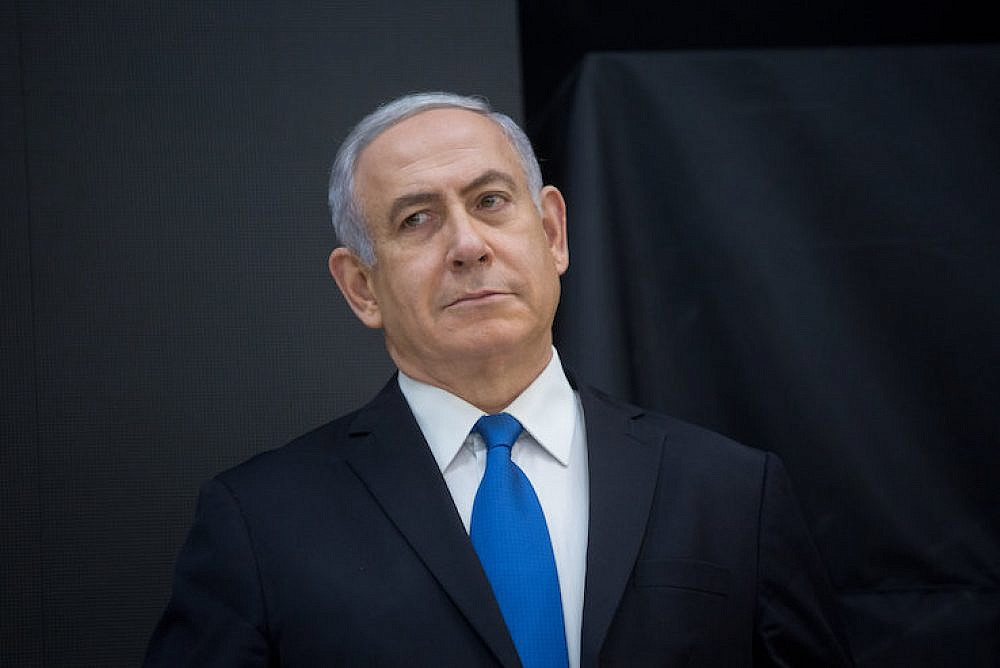Prime Minister Benjamin Netanyahu once remarked that “Our enemies do not hate us because of what we do, but because of who we are.” This also happens to be the basis for his belief in his own innocence as he faces bribery charges and possible jail time.
In his words, Netanyahu is convinced that he must be judged based on who he is, rather than the deeds he has committed. Since he is prime minister, he believes it goes without saying that he cannot commit a crime. He, after all, sits at the top of the pyramid, towering over everyone else; he deserves to be above the law.
Netanyahu’s entire political career has revolved around combating the idea of human equality and creating a human hierarchy instead, in which he is to be counted among those at the top. His “terrorism project” — namely, his attempt to portray Islam as the nemesis of humanity (at the bottom rung of the social hierarchy) — is a necessary narrative to suspend the law; or, more precisely, to suspend the notion of equality before the law.
His portrayal of Islam as humanity’s enemy is wholly intended to create a sense of lawlessness for the belligerents in the West (those at the top of the social ladder), which will enable those belligerents to swell their coffers and continue to rule. In other words, only they are allowed to break the law.
This is not just one of Netanyahu’s whims — his project has broad support in Israel. The ethnic and class-based hierarchical regime in Israel rests on the assumption that it is not what you do that is important, but what matters is who you are. This understanding is precisely what pushed impoverished Mizrahi Jews to aspire to become part of the powerful Jewish collective, and thus enjoy its fair share of the plunder, rather than fight for equal civil rights for all.

This ethnic Jewish unity leaves millions of Palestinians under oppression and bereft of civil rights — an issue that is acceptable to the majority of the Jewish population in Israel. For example, the Jewish lower classes, who have an interest in rising up and protesting in the name of civil equality, instead hold fast to their Jewishness as an insurance policy. Their Israeli citizenship, the very fact that they are citizens, is of little value to them. The only group, then, that actually uses its citizenship to negotiate with the ruling class is Israel’s Palestinian citizens.
This belief is compounded by Netanyahu’s American, capitalist education, according to which genetically-gifted individuals are entitled to wealth and control over human society in direct proportion to their measured skill level. This idea, too, is broadly accepted and exalted among Israelis.
That is why the idea of civic equality — currently expressed in the indictments against Netanyahu — faces relatively large opposition in Israel. Netanyahu and his supporters are fostering the idea that he is entitled to special treatment, while many Israeli jurists argue that public figures should set an example of integrity. The latter believe that a public figure who commits a crime should step down (as they should in democratic regimes), rather than take advantage of the fact that in Israel the prime minister is not legally obligated by law to leave their post.
Legal authorities pretend that Israel is a proper democracy, but Israel is neither proper nor a democracy. When there is no civil equality between the river and the sea, and when the state holds millions of people without human rights, it is very easy to undo the gentlemen’s agreements among the ruling class. After all, the rule of law in Israel means different laws for Palestinians and Jews.
So, many ask, why not apply different rules to the prime minister and his family? It’s enough that a political outsider such as Netanyahu can decide that he wants to continue living a life of corruption and nepotism in order to have many Jewish Israeli supporters, even those who do not personally benefit from Likud rule. That is precisely how the clash between Netanyahu and Israel’s legal authorities exposes the Israeli regime for what it truly is.

